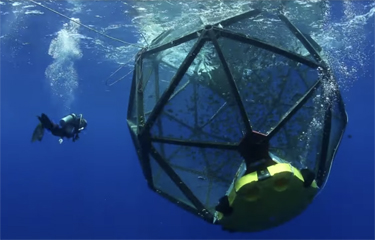Florida officials in June requested that the U.S. Commerce Department designate federal waters off the state’s coast as a marine aquaculture opportunity area, a move that would open and jumpstart the state’s offshore aquaculture industry.
The term “aquaculture opportunity area” comes from the Trump Administration’s 7 May executive order titled “Promoting American Seafood Competitiveness and Economic Growth,” which laid out a variety of strategic plan to promote the growth of the U.S. seafood sector, including aquaculture. The executive order charged federal agencies with identifying “at least two geographic areas containing locations suitable for commercial aquaculture.”
Officials from Florida want their state to be one of those locations. In a 10 June letter to U.S. Secretary of Commerce Wilbur Ross, Florida Commissioner of Agriculture Nikki Fried made a case for a potential designation for the state.
“As one of the fastest growing agribusinesses in the world, aquaculture is rapidly expanding in both diversity and scale to meet the growing demand for safe, affordable, and nutritious seafood commodities,” she wrote. “While the U.S. has been a leader in technological innovations and production research, our country has experienced virtually none of the economic benefits due to cumbersome and uncertain federal policies, or the lack thereof.”
According to Fried, an opportunity to be one of the first offshore aquaculture leaders in the country would be a boon for the state’s struggling industry, which generated USD 3.2 billion (EUR 2.9 billion) annually and supporting more than 76,000 jobs. But the sector has been hit hard by the economic impacts of the COVID-19 pandemic, according to a report from the University of Florida.
“Florida is uniquely positioned to advance an environmentally sustainable offshore aquaculture industry in the Gulf of Mexico and the southern Atlantic Ocean,” Fried said. “Our state has a proven and streamlined submerged-lands leasing process for marine aquaculture that has functioned for decades, and to date oversees 1,304 aquaculture lease parcels covering 3,918 acres of state waters.”
One of the most interested parties involved in the initiative is Ocean Era, a Hawaii-based an open-ocean mariculture start-up formerly known as Kampachi Farms. Ocean Era’s Florida pilot project, Velella Epsilon, would be located 45 miles south west of Sarasota. The project would farm 20,000 almaco jack, a fish native to the Gulf of Mexico, in one net-pen.
“The idea of aquaculture opportunity areas is a highly-enlightened approach that falls in line with what the environmental community has been saying for years,” Ocean Era CEO Neil Sims told SeafoodSource. “Let’s approach aquaculture with a sense of it being part of an integrated planning process.”
Ocean Era previously operated fish pens off the coast of Kona, Hawaii, and the Velella Epsilon project is meant to be a small pilot program designed to serve as an educational platform and collect data associated with offshore aquaculture production, according to Sims. The stock of 20,000 is likely too small to have a major environmental impact in the region, but the project has been met with opposition from Sarasota officials concerned with ecological differences between Hawaii and Florida. They are also worried the farm could wrosen the state’s issues with red tide and the say they need for more proof-of-concept before approving the project.
Sims said while it’s too early to tell if Trump’s executive order will be remembered at as a turning point in the advancement of offshore aquaculture in the U.S., it is a necessary step in the right direction.
“It never feels like we’re turning a corner [in aquaculture development and regulations] – it’s more like an arc,” he said. “And we’re slowly bending toward where we need to be with the regulatory framework, increasing community, recognition of the need for aquaculture, the conservation and NGO community accepting the imperative for offshore development, the technology and feed development … it’s all trending in the right direction.”
Offshore aquaculture is the only way to scale the seafood industry to meet the nutritional requirements of a global population in excess of 9 billion people, Sims said.
“Broadly speaking, I think there is a tremendous market opportunity for Gulf-grown seafood,” he said. “A lot of people’s concerns [in the U.S.] about aquaculture and offshore aquaculture are because its coming from foreign production. If we can demonstrate that we're able to meet the very robust environmental standards for U.S. offshore waters and the fastidious food safety standards that we have here in the U.S., we’ll check all the boxes for U.S. consumers.”
Ocean Era is currently awaiting a decision from the Environmental Protection Agency on whether the Velella Epsilon can move forward this year.
Photo courtesy of Ocean Era







